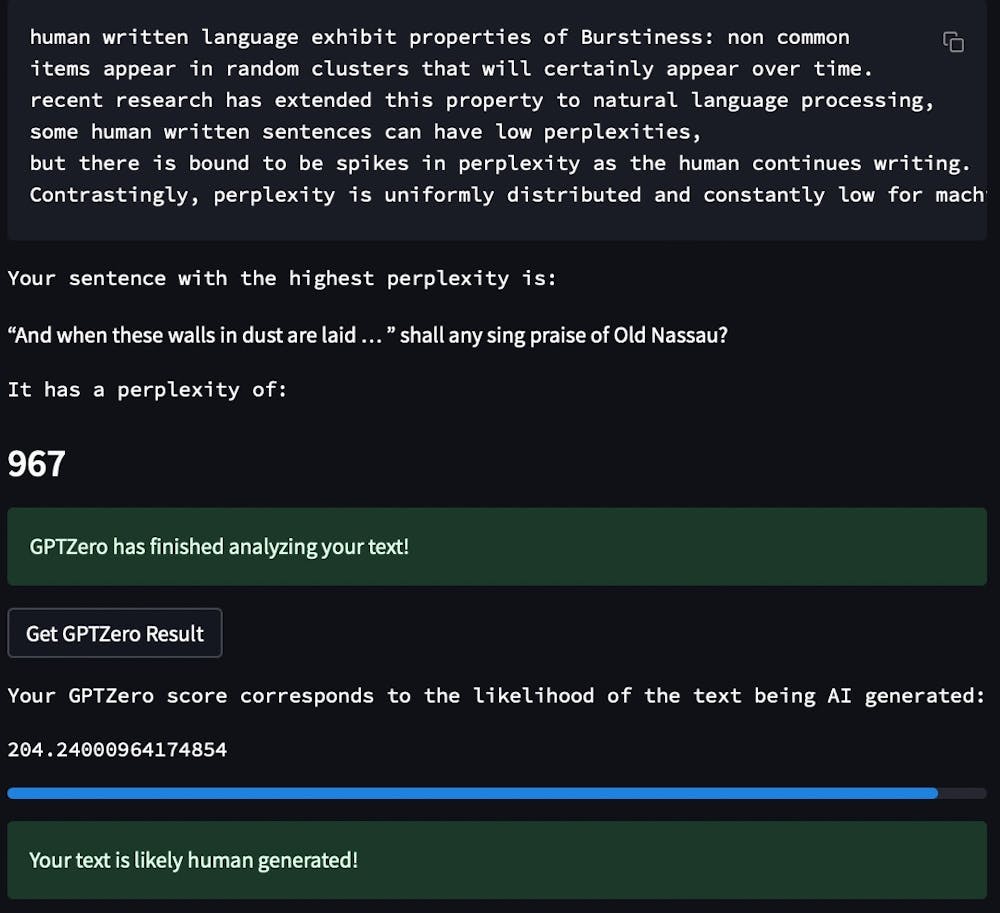When Edward Tian ’23 first heard about ChatGPT, a new chatbot software, he asked it to write raps. Then, during winter break, Tian, a computer science concentrator who is writing his thesis on artificial intelligence (AI) detection, spent a few days sitting in a local coffee shop in Toronto coding a software now named GPTZero that detects writing produced by AI.
Tian is a senior news writer for The Daily Princetonian.
Tian tweeted out the beta version on Jan. 2. Tian’s tweet has since amassed over 7 million views and, according to Tian, GPTZero has been downloaded by people in 40 states and 30 countries. Additionally, his product was covered in the New York Times, the Washington Post, and the Wall Street Journal among other outlets. Tian spoke with the ‘Prince’ about GPTZero and the future of his software.
“I had a bunch of free time over break,” he said in an interview. “I was like, maybe I’ll just code this out, so everybody can use it.”
ChatGPT is an AI chatbot made by OpenAI, a seven-year-old artificial intelligence research company, that can carry on conversations with users and produce longer pieces of writing in a variety of styles in response to a prompt in plain English. ChatGPT has been the focus of substantial discussion based on its advances in accuracy and potential uses in a variety of fields. Tian said that the public conversation around ChatGPT prompted him to think about the potential impact that its impressive prose could have on plagiarism in academic writing.
“The last few weeks, the hype around ChatGPT has been so crazy,” he said. “That’s what’s got me thinking about the impact towards teachers and schools.”
Through his work on AI detection for his thesis, Tian had already spent time thinking about the technology and had some of it on his laptop.
GPTZero uses two metrics to estimate the probability that the text was written by AI: perplexity and burstiness. Perplexity measures the randomness of the word choice and construction of a given sentence and burstiness compares perplexity across sentences. ChatGPT works by predicting the most common next word, so the more random the construction of a text both within and across sentences, the more likely it was written by a human.

In a statement to the ‘Prince,’ Jennifer Rexford ’91, Chair of the Department of Computer Science, wrote that “Tian’s innovative GPTZero application is a wonderful example of Princeton students engaging deeply with both the technical and the social implications of the rapid developments in artificial intelligence.”
Despite receiving multiple calls from venture capitalists, Tian has decided he will not sell the software, and instead has chosen to focus on improving it. He recruited a few recent Princeton alumni who he has worked with in the past to help him improve the model.
On Sunday, Jan. 15, this group released GPTZeroX, which includes new features, including highlighting certain phrases or sentences within a text that it believes may have been written by AI. They wrote in their GPTZero Substack that they have big plans for the future of the software.
“GPTZero may have started out small, but our plans are certainly not,” they wrote.

Tian said that the group is currently working on identifying implicit bias in AI-generated text.
“Is there something implicit in machine-written articles that human-written articles do not have? We think that there probably is,” he said.
GPTZero was released amid public concern about how students may use ChatGPT to cheat on their essays and how it may impact typical essay assignments. For this reason, school districts across the country have blocked ChatGPT on school devices and networks. Despite these fears, Tian is not against developments in AI.
“Everyone should use these new technologies. But it’s important that they’re not misused,” he said.
Tian explained that his motivation for creating GPTZero stems from the beauty of writing. “There should be aspects of human writing that machines can never co-opt,” he said.
Julian Hartman-Sigall is an Assistant News Editor and Assistant Newsletter Editor for the ‘Prince.’
Please direct any corrections requests to corrections[at]dailyprincetonian.com.








